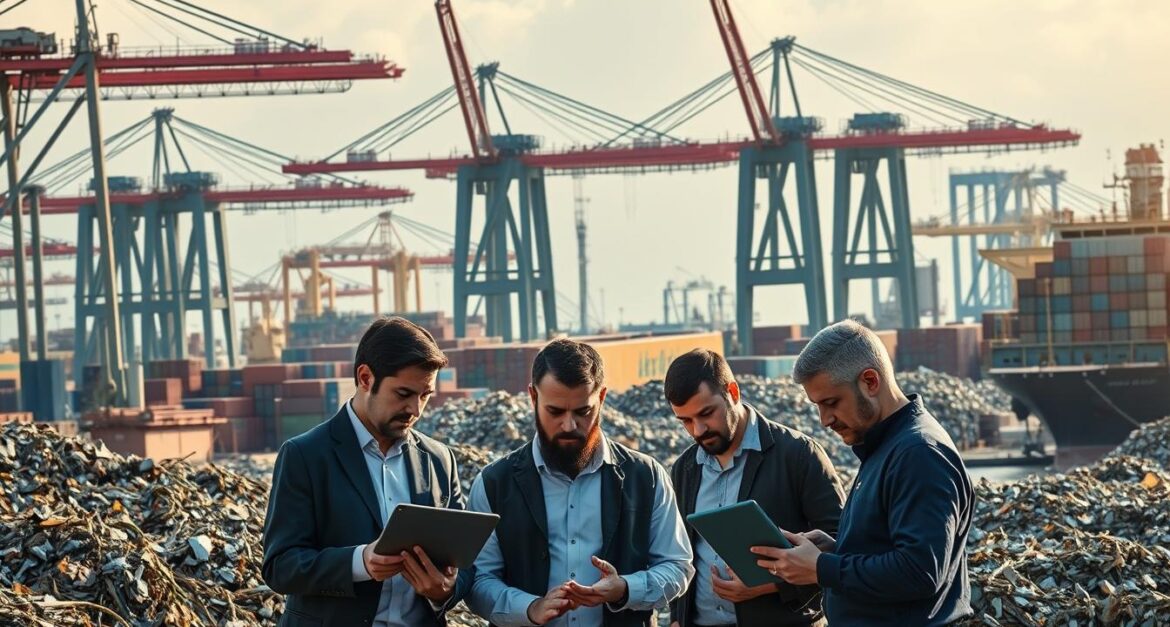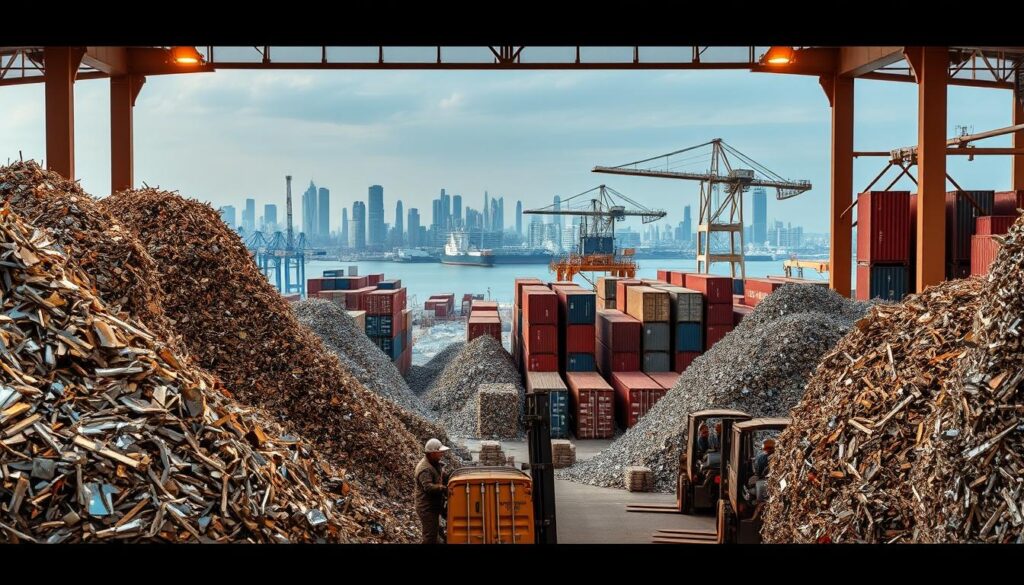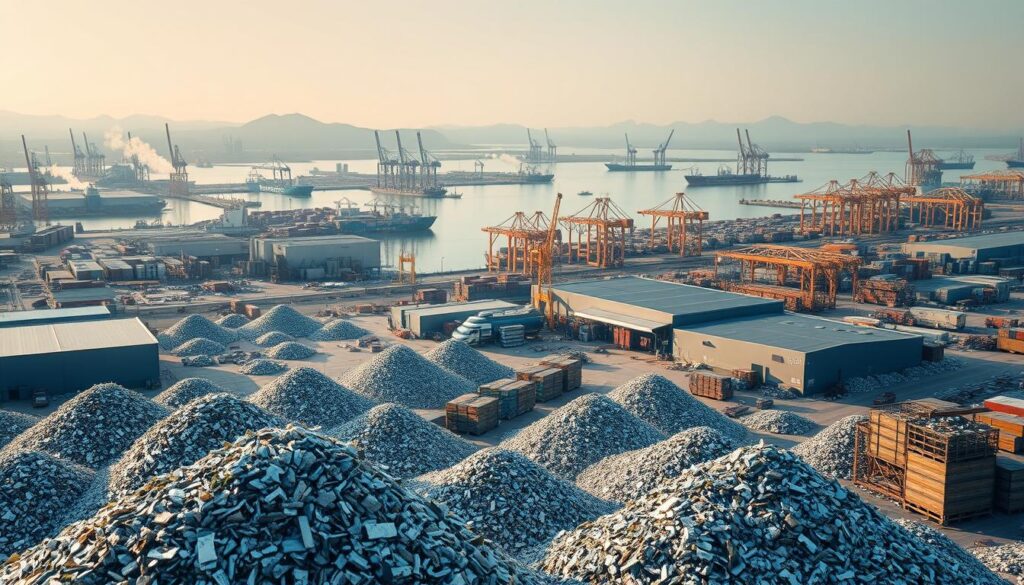
The global aluminium scrap trading industry is experiencing a significant surge, driven by increasing demand for recycled aluminium in various sectors, including automotive and construction.
As a leading global import-export solutions provider, Skylink Imports is at the forefront of this trend, bridging the gap between manufacturers and markets with unmatched efficiency and reliability.
The aluminium scrap industry is evolving rapidly, with aluminium scrap industry updates indicating a shift towards more sustainable practices and increased trade volumes.
Key Takeaways
- Increasing demand for recycled aluminium is driving growth in the global aluminium scrap trading industry.
- Skylink Imports is a leading player in the global import-export market, providing efficient and reliable solutions.
- The aluminium scrap industry is shifting towards more sustainable practices.
- Global aluminium market trends are influencing the aluminium scrap trading industry.
- Trade volumes in the aluminium scrap industry are on the rise.
The Current State of the Global Aluminium Scrap Industry
The global aluminium scrap industry has witnessed significant transformations over the years, driven by advancements in recycling technologies and shifting market dynamics. As the industry continues to evolve, it is essential to understand its current state.
Historical Development and Market Evolution
The aluminium scrap industry has a rich history, with its roots tracing back to the early 20th century. Over the years, it has evolved significantly, influenced by factors such as technological innovations, economic fluctuations, and environmental regulations. Today, the industry is a complex network of suppliers, recyclers, and manufacturers working together to meet the growing demand for sustainable scrap aluminium solutions.
Economic Significance of Aluminium Recycling
Aluminium recycling plays a crucial role in the global economy, offering numerous benefits, including energy savings, reduced greenhouse gas emissions, and conservation of natural resources. The economic significance of aluminium recycling is underscored by its contribution to the global aluminium supply chain, with recycled aluminium accounting for a substantial portion of the world’s total aluminium production. This highlights the importance of aluminium scrap recycling advancements in meeting the industry’s economic and environmental goals.
Key Players in the Global Supply Chain
The global aluminium scrap supply chain involves various key players, including suppliers, recyclers, traders, and manufacturers. Companies like Skylink Imports play a vital role in connecting manufacturers and markets worldwide, offering efficient, reliable, and transparent import-export services. Understanding the roles of these key players is essential for gaining aluminium scrap trade insights.

| Key Players | Roles | Significance |
|---|---|---|
| Suppliers | Provide aluminium scrap | Essential for recycling |
| Recyclers | Process aluminium scrap | Critical for producing recycled aluminium |
| Traders | Facilitate the trade of aluminium scrap | Enable global supply chain connectivity |
| Manufacturers | Use recycled aluminium in production | Promote sustainable practices |
Latest Trends made in the Global Aluminium Scrap Trading
The global aluminium scrap trading landscape is undergoing significant changes due to recent market trends. As the industry adapts to new challenges and opportunities, several key trends are emerging.
Shifting Supply Chain Dynamics Post-Pandemic
The COVID-19 pandemic has had a lasting impact on global supply chains, including the aluminium scrap trading industry. Companies like Skylink Imports, which specialise in sourcing and procurement, have had to adapt to new logistical challenges. The pandemic has accelerated the shift towards more resilient and flexible supply chains.
- Increased focus on local sourcing to reduce dependency on international suppliers.
- Implementation of advanced logistics technologies to improve supply chain visibility.
- Development of contingency plans to mitigate future disruptions.
Price Volatility and Market Responses
Price volatility remains a significant challenge in the global aluminium scrap market. Factors such as energy costs, currency fluctuations, and trade policies contribute to market instability. Traders and recyclers must employ sophisticated market analysis tools to navigate these challenges.
Key strategies for managing price volatility include:
- Utilising real-time market data to inform trading decisions.
- Diversifying supply sources to reduce exposure to market fluctuations.
- Implementing hedging strategies to mitigate potential losses.
Digital Transformation in Trading Practices
The aluminium scrap trading industry is embracing digital transformation to improve efficiency and transparency. Technologies such as blockchain, AI, and IoT are being adopted to streamline trading practices and enhance market responsiveness.

Digital platforms are facilitating more efficient transactions and providing valuable market insights. As the industry continues to evolve, the adoption of innovative technologies is expected to play a crucial role in shaping its future.
Technological Innovations Revolutionising Scrap Processing
Technological innovations are transforming the aluminium scrap recycling landscape. The industry is witnessing significant advancements in processing technologies, driven by the need for more efficient and sustainable practices.
Advanced Sorting and Separation Technologies
Advanced sorting and separation technologies are crucial for improving the quality and yield of aluminium scrap recycling. Techniques such as sensor-based sorting and magnetic separation enable the precise identification and segregation of aluminium alloys. These technologies enhance the purity of the recycled material, making it more valuable and suitable for various applications.
- Sensor-based sorting for precise material identification
- Magnetic separation for efficient alloy segregation
- Advanced eddy current separation for non-ferrous metal recovery
Automation and AI in Scrap Management
The integration of automation and AI in scrap management is revolutionising the way aluminium scrap is processed. Automated systems can optimise the sorting process, reduce labour costs, and improve overall efficiency. AI algorithms can predict the quality and composition of scrap materials, enabling more informed decision-making.
Skylink Importsoffers efficient and reliable import-export services that can facilitate the adoption of these advanced technologies.
Quality Enhancement Techniques for Higher Recovery Rates
Quality enhancement techniques are vital for achieving higher recovery rates in aluminium scrap recycling. Processes such as dross processing and aluminium refining help to maximise the recovery of valuable materials. By improving the quality of the recycled aluminium, these techniques contribute to the production of high-grade materials that meet the stringent requirements of various industries.
By embracing these technological innovations, the aluminium scrap recycling industry can become more sustainable and efficient, ultimately contributing to a more circular economy.
Sustainability and Circular Economy in Aluminium Recycling
With growing environmental awareness, the aluminium recycling industry is focusing on sustainable scrap aluminium solutions to reduce its ecological footprint. This shift is driven by the need to adopt circular economy principles that promote recycling, reduce waste, and enhance the overall sustainability of the industry.
Environmental Benefits and Carbon Footprint Reduction
The aluminium recycling process offers significant environmental benefits, including a substantial reduction in carbon footprint compared to primary aluminium production. By recycling aluminium, the industry can save up to 95% of the energy required for producing primary aluminium, leading to a considerable decrease in greenhouse gas emissions.
Moreover, recycling aluminium scrap helps in conserving natural resources and reducing landfill waste. As the demand for sustainable materials grows, the aluminium recycling industry is poised to play a crucial role in mitigating climate change and potentially expanding into emerging aluminium scrap markets.
Corporate Sustainability Initiatives and ESG Reporting
Companies in the aluminium recycling sector are increasingly adopting corporate sustainability initiatives and ESG (Environmental, Social, and Governance) reporting to demonstrate their commitment to transparency and sustainability. Skylink Imports, for instance, is committed to transparency and reliability in its operations, reflecting the industry’s move towards more responsible practices.
ESG reporting enables companies to track their progress in sustainability, identify areas for improvement, and communicate their efforts to stakeholders. This transparency is essential for building trust and driving the industry towards a more sustainable future.
Consumer-Driven Demand for Sustainable Aluminium Products
The growing consumer awareness of environmental issues is driving demand for sustainable aluminium products. As a result, manufacturers are under pressure to incorporate recycled aluminium into their products, further boosting the demand for aluminium scrap.
This consumer-driven demand is expected to continue growing, pushing the aluminium recycling industry to innovate and expand its capacity to meet the needs of a more sustainable future.
Regional Market Analysis: Focus on North America and Canada
As the global aluminium market evolves, Canada’s position in the North American aluminium scrap trading scene is gaining attention. The Canadian aluminium scrap market is a significant player in the global supply chain, with companies like Skylink Imports, headquartered in Calgary, contributing to the industry’s dynamics.
Canadian Aluminium Scrap Market Dynamics
The Canadian aluminium scrap market is characterised by its robust recycling infrastructure and strategic geographical location. The country’s recycling facilities are equipped with advanced technology to process aluminium scrap efficiently, making it an attractive hub for aluminium recycling.
Key factors influencing the Canadian market include the availability of raw materials, regulatory frameworks, and trade agreements. The market is also driven by the demand for sustainable aluminium products, with consumers increasingly preferring products made from recycled aluminium.
United States Market Influence on Canadian Trade
The United States is a significant trading partner for Canada, and the US market has a considerable influence on the Canadian aluminium scrap trade. The trade dynamics between the two countries are shaped by factors such as tariffs, trade agreements, and market demand.
The US market’s demand for aluminium scrap affects Canadian exports, with fluctuations in US demand impacting Canadian trade. Understanding these dynamics is crucial for Canadian businesses to navigate the market effectively.
Opportunities for Canadian Businesses in Global Markets
Canadian businesses have numerous opportunities to expand their presence in global aluminium markets. By leveraging Canada’s reputation for high-quality recycled aluminium, companies can explore new markets and forge strategic partnerships.
Emerging markets in developing economies present a significant opportunity for Canadian aluminium scrap exporters. Additionally, the growing demand for sustainable products globally aligns with Canada’s capabilities in aluminium recycling, positioning Canadian businesses for growth.
Economic and Trade Factors Influencing the Industry
The aluminium scrap industry is significantly influenced by various economic and trade factors. Companies like Skylink Imports, which specialise in sourcing and procurement, must navigate these complexities to remain competitive.
Impact of Energy Costs on Recycling Economics
Energy costs play a crucial role in the economics of aluminium recycling. The process of melting aluminium scrap is energy-intensive, and fluctuations in energy prices can significantly affect the profitability of recycling operations. Efficient energy management is thus critical for recyclers to maintain competitiveness in the global market.
Currency Fluctuations and International Trade Dynamics
Currency fluctuations can impact the global trade of aluminium scrap. A strong currency can make exports more expensive, potentially reducing demand, while a weak currency can make imports more costly. Understanding these dynamics is essential for businesses involved in international trade to manage risks effectively.
Tariffs and Trade Agreements Affecting Aluminium Scrap
Tariffs and trade agreements are other critical factors influencing the aluminium scrap trade. Changes in tariff policies can either restrict or facilitate the flow of aluminium scrap across borders. Trade agreements can also play a significant role in shaping the industry by reducing or eliminating tariffs, thus affecting the global supply chain.
In conclusion, the aluminium scrap industry is subject to a variety of economic and trade factors. Staying informed about these factors and adapting to changes is crucial for businesses to thrive in this dynamic environment.
Regulatory Landscape and Compliance Requirements
Navigating the regulatory environment is crucial for businesses involved in aluminium scrap trading, as compliance requirements continue to evolve. The industry is subject to a myriad of regulations that impact its operations globally, making it essential for companies to stay informed and adapt to these changes.
International Regulations Governing Scrap Trading
International regulations play a significant role in governing the aluminium scrap trading industry. The Basel Convention, for instance, regulates the transboundary movement of hazardous waste, including certain types of aluminium scrap. Compliance with such regulations is critical to avoid legal repercussions and ensure sustainable practices.
Companies like Skylink Imports, which offer reliable import-export services, must navigate these regulations carefully to maintain their operations. Understanding and adhering to international regulations not only ensures compliance but also enhances the reputation of businesses in the global market.
Environmental Compliance and Waste Management Standards
Environmental compliance is a critical aspect of the aluminium scrap trading industry. Businesses must adhere to waste management standards that minimise environmental impact. This includes proper handling, storage, and disposal of aluminium scrap, as well as adherence to emissions standards for recycling facilities.
Effective waste management practices not only reduce the environmental footprint of aluminium scrap trading but also contribute to the overall sustainability of the industry. Companies that prioritise environmental compliance are better positioned to capitalise on the growing demand for sustainable scrap aluminium solutions.
Quality Certification and Industry Standards
Quality certification and adherence to industry standards are vital for maintaining the integrity of aluminium scrap. Certifications such as the ISO 9001 for quality management systems can enhance the credibility of businesses involved in aluminium scrap trading.
By adhering to industry standards, companies can ensure the quality of their aluminium scrap, reduce the risk of contamination, and improve the efficiency of the recycling process. This, in turn, supports the advancement of aluminium scrap recycling technologies and the overall growth of the industry.
In conclusion, the regulatory landscape and compliance requirements are critical factors that influence the aluminium scrap trading industry. By understanding and adhering to international regulations, environmental compliance standards, and quality certifications, businesses can navigate the complexities of the industry and contribute to its sustainable growth.
Emerging Markets and Future Growth Opportunities
Emerging economies are becoming new trading hubs in the aluminium scrap industry, driven by increasing demand and infrastructure development. As these economies grow, their need for aluminium scrap is rising, creating new opportunities for traders and recyclers.
Developing Economies as New Trading Hubs
Developing economies, particularly in Asia and Latin America, are investing heavily in infrastructure projects, driving up the demand for aluminium. This shift is transforming the global aluminium scrap market, with countries like India and Brazil emerging as significant players.
Skylink Imports, a leading global trader, is connecting manufacturers and markets worldwide, facilitating the growth of emerging markets in the aluminium scrap industry.
Innovative Business Models in Scrap Trading
The aluminium scrap industry is witnessing the emergence of innovative business models, including digital platforms that connect buyers and sellers more efficiently. These platforms are reducing transaction costs and increasing transparency in the market.
New business models are also focusing on sustainability, with companies adopting circular economy practices that promote the recycling of aluminium scrap.
Strategic Partnerships and Vertical Integration Trends
Strategic partnerships and vertical integration are becoming increasingly important in the aluminium scrap industry. Companies are forming alliances to secure supply chains and improve their market position.
Vertical integration is also allowing companies to control more of the value chain, from scrap collection to aluminium production, enhancing their competitiveness in the global market.
| Region | Growth Rate | Key Drivers |
|---|---|---|
| Asia | 8% | Infrastructure development, increasing demand for aluminium |
| Latin America | 6% | Economic growth, industrialisation |
| Africa | 5% | Urbanisation, infrastructure projects |
Conclusion: The Future of Aluminium Scrap Trading
The global aluminium scrap trading industry is on the cusp of a new era, driven by the latest trends made in the global aluminium scrap trading. As sustainability becomes a core focus, companies like Skylink Imports are playing a crucial role in shaping the industry’s future. With the increasing demand for environmentally friendly practices and the integration of advanced technologies, the industry is set to experience significant growth.
The future outlook for global aluminium scrap trading is promising, with emerging markets and innovative business models creating new opportunities. As the industry continues to evolve, it is essential for businesses to stay ahead of the curve by adopting the latest trends and technologies. Skylink Imports, as a global import-export solutions provider, is well-positioned to facilitate this growth.
As the industry moves forward, it is clear that the latest trends made in the global aluminium scrap trading will continue to drive its development. With companies like Skylink Imports at the forefront, the future of aluminium scrap trading looks bright.
Email us: info@skylinkimports.com
Contact us: +1 (403) 266-9394, +91-9041-543543





